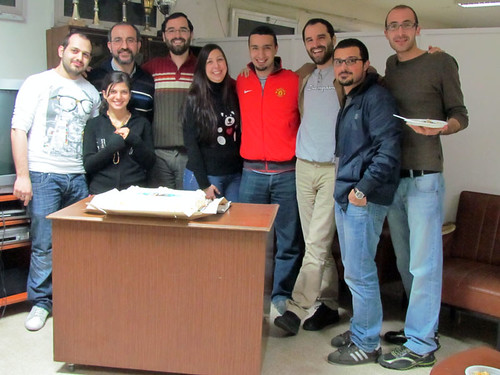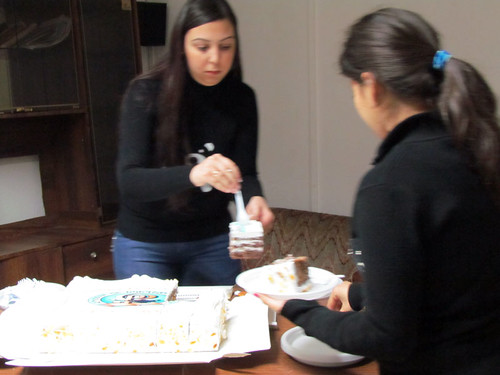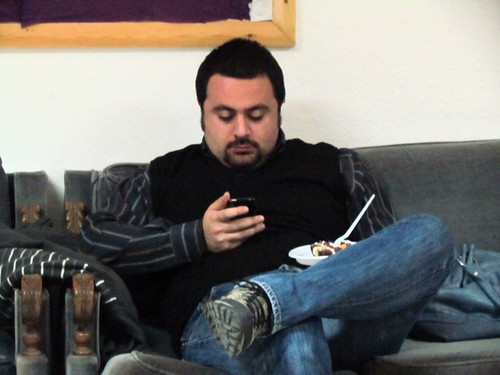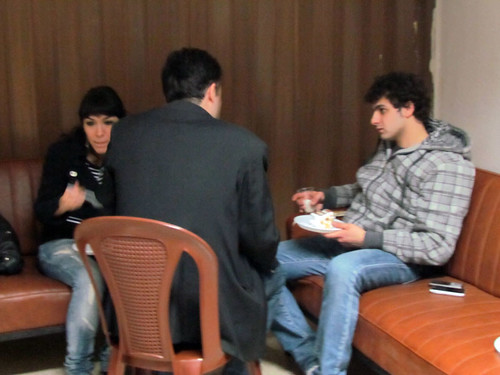ՊԱՏՄՈՒԹԵԱՆ ԴԱՍԱՊԱՀԵՐՈՒՆ ԱՐԺԱՆԱՀԱՒԱՏՈՒԹԻՒՆԸ
The Emmanuel Church Football Champions Presenting the Championship Cup to their Pastor, Rev. Hovhanness Svajian
A Special Meeting for the Ministry of Chanitz Blog
On, Saturday, 12 March, a special meeting was held for the ministry of the Chanitz Blog. After dinner, a brainstorming session took place regarding the name, committee, content, and financial matters of this ministry.
The meeting decided to form a sub-committee, which will prepare a draft bylaws of the ministry. The representing members were: Hokapartsoutyoun, Khnamagaloutyoun, Chanitz varchoutyoun, as well as the administrator of the Chanitz Blog and others (19 in number).




The meeting decided to form a sub-committee, which will prepare a draft bylaws of the ministry. The representing members were: Hokapartsoutyoun, Khnamagaloutyoun, Chanitz varchoutyoun, as well as the administrator of the Chanitz Blog and others (19 in number).




Emmanuel Church's Chanitz Retreat
This year's retreat of the Chanitz youth group took place in Kchag, the Summer Camp Center, from 9-10 April, with 29 youth participating.
The subject was "God speaks through the Holy Spirit, in circumstances, to reveal Himself and His will to us", from the book that the youth are studying, Experiencing God.
The presenter of the subject was Badveli Datev Basmajian.
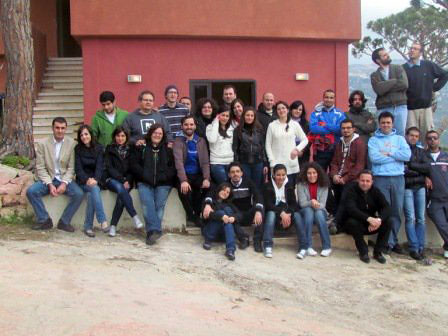

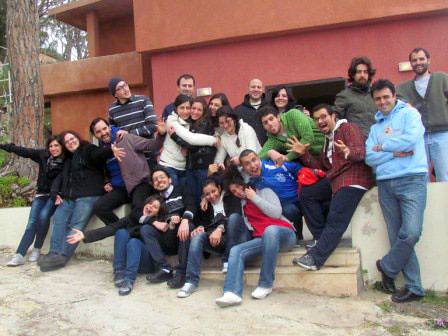
The subject was "God speaks through the Holy Spirit, in circumstances, to reveal Himself and His will to us", from the book that the youth are studying, Experiencing God.
The presenter of the subject was Badveli Datev Basmajian.



Armenian Cultural Day in the Armenian Evangelical Central High School
Efforts toward Genocide Recognition - Rev. L. Nishan Bakalian
It was only a few days before Christmas 2010, and also the dying hours of the last session of the 111th Congress, when I found myself in Washington officially representing the Armenian Evangelical Union of North America, lending my support to the efforts to get the Armenian Genocide Resolution (H.R. 252) approved. Organized by the Armenian National Committee, a couple dozen volunteers, mostly young men and women and a few older clergy, such as me, spent an entire day ducking in and out of offices, trying to catch those representatives who were undecided to ask how they would vote on the resolution. My task was to appeal to their conscience regarding what should be a human rights issue and to remind them that the impunity which has reigned for the past ninety-six years must not continue if crimes like this are ever going to be stopped.
I realize that not everyone agrees that congressional resolutions are worth anything, or that the crime of genocide can be effectively combated. I think that simply remaining silent on the subject is worse than making no attempt whatsoever. Many Armenians think that the effort spent on pursuing the passage of these resolutions is a waste of time. Many Americans think it is against this country’s interests to “dredge up the past” and tantamount to disloyalty to endanger a strategic alliance for the sake of a proclamation. Turkey, however, views it with the utmost seriousness, and expends considerable energy to thwart any official mention of the subject, or that unmentionable word, genocide. considers it of the utmost importance. Enter: the “dueling grandmothers”.
I was paired up with an Armenian Catholic fellow from Providence, more experienced than I in moving about the halls of our nation’s capital. In our trek through the congressional office buildings, as were searching for the next representative on our list, we encountered a large, friendly fellow who extended his hand in greeting and said with a smile, “Are you working on the Genocide Resolution?” When we said “yes”, he responded, “I am, too! But on the other side.” And so we stood there in the hallway and talked or, rather, listened to his arguments as to why the resolution was a mistake. We had heard it all before: it was a long time ago; history should be left to the historians and not to politicians; many people on both sides were killed; Armenians were siding with the Russians; etc., etc. My cohort countered with arguments that this Turkish fellow had no doubt heard before: that an indigenous population does not just “disappear”; that something cataclysmic must have happened for them to forsake their homes and villages; and so forth. Finally our “sparring partner” said this: “My grandmother told me about how the Armenians in her town attacked them with weapons, and so they sent for help from the Turkish troops. If they had not arrived, the Turkish villagers would have all been massacred!”
On the other hand, we also met some aides and congressional staffers who were clearly not enamored of the cynical attitude of the Turkish government or its agents, and clearly stated that “there’s no question that what was perpetrated was genocide.” Words such as this were quite heartening, especially when coming from people who have no vested interests in “playing to the Armenians.”
Earlier in the year, in April, again in Washington, D.C., I represented the AEUNA when the President of Armenia, Serzh Sargsyan, placed a wreath at Woodrow Wilson’s tomb. There in the National Cathedral I wondered what Wilson, Morgenthau, Davis and other diplomats and public servants of that time would have thought of our struggle today simply to gain recognition for something that had been so plainly obvious to them. They wrote about it, and pled the cause of the persecuted, and strove to establish a free and independent homeland, so that the Armenian people would have a respite from greedy and malicious forces. This is why today we continue to speak and write about the Genocide, and we pray to our sovereign God to inspire in today’s public servants courage, principled thought, and a love of the truth, in place of the expediency and arrogant self-interest that is so prevalent. Perhaps then those in authority would be better able to provide the moral leadership so much in need in this country and in our world.

Rev. Bakalian is the pastor of the Armenian Martyrs’ Congregational Church of Greater Philadelphia and formerly the Campus Minister at Haigazian University, Beirut, Lebanon
I realize that not everyone agrees that congressional resolutions are worth anything, or that the crime of genocide can be effectively combated. I think that simply remaining silent on the subject is worse than making no attempt whatsoever. Many Armenians think that the effort spent on pursuing the passage of these resolutions is a waste of time. Many Americans think it is against this country’s interests to “dredge up the past” and tantamount to disloyalty to endanger a strategic alliance for the sake of a proclamation. Turkey, however, views it with the utmost seriousness, and expends considerable energy to thwart any official mention of the subject, or that unmentionable word, genocide. considers it of the utmost importance. Enter: the “dueling grandmothers”.
I was paired up with an Armenian Catholic fellow from Providence, more experienced than I in moving about the halls of our nation’s capital. In our trek through the congressional office buildings, as were searching for the next representative on our list, we encountered a large, friendly fellow who extended his hand in greeting and said with a smile, “Are you working on the Genocide Resolution?” When we said “yes”, he responded, “I am, too! But on the other side.” And so we stood there in the hallway and talked or, rather, listened to his arguments as to why the resolution was a mistake. We had heard it all before: it was a long time ago; history should be left to the historians and not to politicians; many people on both sides were killed; Armenians were siding with the Russians; etc., etc. My cohort countered with arguments that this Turkish fellow had no doubt heard before: that an indigenous population does not just “disappear”; that something cataclysmic must have happened for them to forsake their homes and villages; and so forth. Finally our “sparring partner” said this: “My grandmother told me about how the Armenians in her town attacked them with weapons, and so they sent for help from the Turkish troops. If they had not arrived, the Turkish villagers would have all been massacred!”
On the other hand, we also met some aides and congressional staffers who were clearly not enamored of the cynical attitude of the Turkish government or its agents, and clearly stated that “there’s no question that what was perpetrated was genocide.” Words such as this were quite heartening, especially when coming from people who have no vested interests in “playing to the Armenians.”
Earlier in the year, in April, again in Washington, D.C., I represented the AEUNA when the President of Armenia, Serzh Sargsyan, placed a wreath at Woodrow Wilson’s tomb. There in the National Cathedral I wondered what Wilson, Morgenthau, Davis and other diplomats and public servants of that time would have thought of our struggle today simply to gain recognition for something that had been so plainly obvious to them. They wrote about it, and pled the cause of the persecuted, and strove to establish a free and independent homeland, so that the Armenian people would have a respite from greedy and malicious forces. This is why today we continue to speak and write about the Genocide, and we pray to our sovereign God to inspire in today’s public servants courage, principled thought, and a love of the truth, in place of the expediency and arrogant self-interest that is so prevalent. Perhaps then those in authority would be better able to provide the moral leadership so much in need in this country and in our world.

____________
The Spirit of Togetherness in Franklin’s City
Philadelphia, July 2010: “Mher, a legendary figure of inspiring power symbolizing the invincible faith of the Armenian people - the first nation to endorse Christianity” reads the inscription on the 22-foot-high Young Meher monument, a gift by the Armenian community to the city of Philadelphia on April 24, 1976 on the occasion of the US Bicentennial. The
sculptor Khoren Der Harootian (1909-1991), a genius of an artist, has Mher holding the cross up and at the base a panoramic basrelief in bronze depicting major tragic events in the history of the Armenian people but
that culminated in their resurrection like the Phoenix from the ashes.
It was this same survival-against-all-theodds history that I witnessed while I preached at the Armenian Evangelical Martyrs’ Congregational Church in Havertown on Sunday, July 4, 2010.
Indeed, Rev. Nishan Bakalian’s inspiring leadership has been very instrumental in the life of the Church. Rev. Bakalian, a Philly, moved with his family to Beirut twice to serve in the institutions of the Union of the Armenian Evangelical Churches in the Near East. He is back in his home city now with the zeal and passion to do more within the Armenian Evangelical Church and Armenian community.
The Armenian Evangelical Church in Philadelphia was founded in 1907 by Rev. Haig Yardumian. The present building in the suburb of Havertown was built in 1964.
This century-old history of the Armenian Evangelical Church in Philadelphia is a living testimony of the community’s commitment to Christ, His Word, and the Armenian nation.
Philadelphia, with its lush green scenery and the beautiful Delaware River, is one of the most beautiful cities in the US. The city is especially proud of one of its citizens, Benjamin Franklin, who was one of the Founding Fathers of the US. Franklin, a writer, inventor, diplomat, businessman, musician, scientist, humanist, and civic leader, helped found a new nation and define the American character.
Rightly, Philadelphia is dubbed as “the city of brotherly love”, as it is home for more than 15,000 Armenians. I also sensed this “brotherly love” when I met with the Armenian Apostolic and Catholic clergy at the luncheon organized by the Armenian Evangelical Church on the occasion of the Independence Day. A spirit of togetherness has been established over the last 50 years where the whole community come together regularly to celebrate Vartanants, Martyrs’ Day, and Tarkmanchats. This same spirit is rooted in the daily lives of the community where the five established Armenian churches, Armenian Catholic St. Mark, Armenian Apostolic Sts. Sahag and Mesrob, Holy Trinity, and St. Gregory the Illuminator, and Armenian Congregational Martyrs’, come together regularly for fellowship, consultation, and celebration of cultural, religious, and historical events.
The Armenian community in Philadelphia is faithful to the historical values of their adopted city with a spirit of togetherness. It is this same spirit that creates a new history with Mher’s enduring power for struggle, existence, and identity.
Hrayr Jebejian







sculptor Khoren Der Harootian (1909-1991), a genius of an artist, has Mher holding the cross up and at the base a panoramic basrelief in bronze depicting major tragic events in the history of the Armenian people but
that culminated in their resurrection like the Phoenix from the ashes.
It was this same survival-against-all-theodds history that I witnessed while I preached at the Armenian Evangelical Martyrs’ Congregational Church in Havertown on Sunday, July 4, 2010.
Indeed, Rev. Nishan Bakalian’s inspiring leadership has been very instrumental in the life of the Church. Rev. Bakalian, a Philly, moved with his family to Beirut twice to serve in the institutions of the Union of the Armenian Evangelical Churches in the Near East. He is back in his home city now with the zeal and passion to do more within the Armenian Evangelical Church and Armenian community.
The Armenian Evangelical Church in Philadelphia was founded in 1907 by Rev. Haig Yardumian. The present building in the suburb of Havertown was built in 1964.
This century-old history of the Armenian Evangelical Church in Philadelphia is a living testimony of the community’s commitment to Christ, His Word, and the Armenian nation.
Philadelphia, with its lush green scenery and the beautiful Delaware River, is one of the most beautiful cities in the US. The city is especially proud of one of its citizens, Benjamin Franklin, who was one of the Founding Fathers of the US. Franklin, a writer, inventor, diplomat, businessman, musician, scientist, humanist, and civic leader, helped found a new nation and define the American character.
Rightly, Philadelphia is dubbed as “the city of brotherly love”, as it is home for more than 15,000 Armenians. I also sensed this “brotherly love” when I met with the Armenian Apostolic and Catholic clergy at the luncheon organized by the Armenian Evangelical Church on the occasion of the Independence Day. A spirit of togetherness has been established over the last 50 years where the whole community come together regularly to celebrate Vartanants, Martyrs’ Day, and Tarkmanchats. This same spirit is rooted in the daily lives of the community where the five established Armenian churches, Armenian Catholic St. Mark, Armenian Apostolic Sts. Sahag and Mesrob, Holy Trinity, and St. Gregory the Illuminator, and Armenian Congregational Martyrs’, come together regularly for fellowship, consultation, and celebration of cultural, religious, and historical events.
The Armenian community in Philadelphia is faithful to the historical values of their adopted city with a spirit of togetherness. It is this same spirit that creates a new history with Mher’s enduring power for struggle, existence, and identity.
Hrayr Jebejian







Armenian Evangelical Ashrefieh Church's Sunday School Visiting Kahl and Elderly House
On Sunday, 22 May 2011 - the Sunday School children, along with their teachers, of the Armenian Evangelical Ashrafieh Church visited Kahl and the Elderly House in Bourj Hammoud.
We spent time with every single elder, singing to them and giving them cookies.
Not only they were happy, but we were blessed to see their smiling faces and hearing their stories.
Gassia Keloukian,
Sunday School teacher










We spent time with every single elder, singing to them and giving them cookies.
Not only they were happy, but we were blessed to see their smiling faces and hearing their stories.
Gassia Keloukian,
Sunday School teacher










The Members of the Armenian Evangelical Emmanuel Church Re-elect Rev. Svajian for Another Term
On Sunday, 20 March - after the church service, and in the presence and chairmanship of the president of the UAECNE, Rev. Megerdich Karagoezian, 47 members of the Armenian Evangelical Emmanuel Church, re-elected Rev. Hovhanness Svajian for another three years to be their pastor.
Preceding the re-election, Rev. Svajian read his report for the past three years in pastoring the church, after which, Rev. Karagoezian reminded the members about their responsibilities and vision as a church.
After the re-election, Rev. Svajian received congratulations and gratitude from the church members.


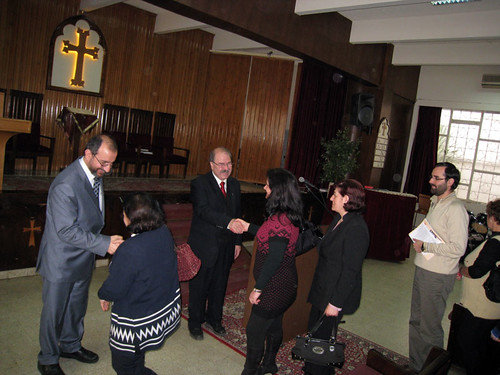


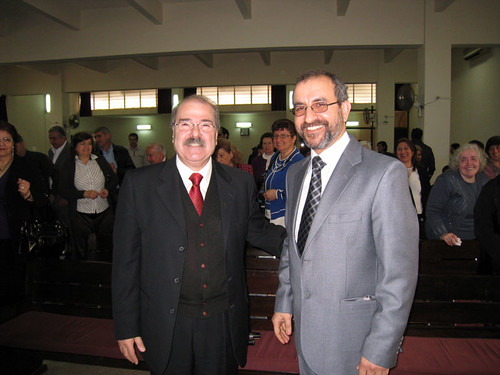
Preceding the re-election, Rev. Svajian read his report for the past three years in pastoring the church, after which, Rev. Karagoezian reminded the members about their responsibilities and vision as a church.
After the re-election, Rev. Svajian received congratulations and gratitude from the church members.









